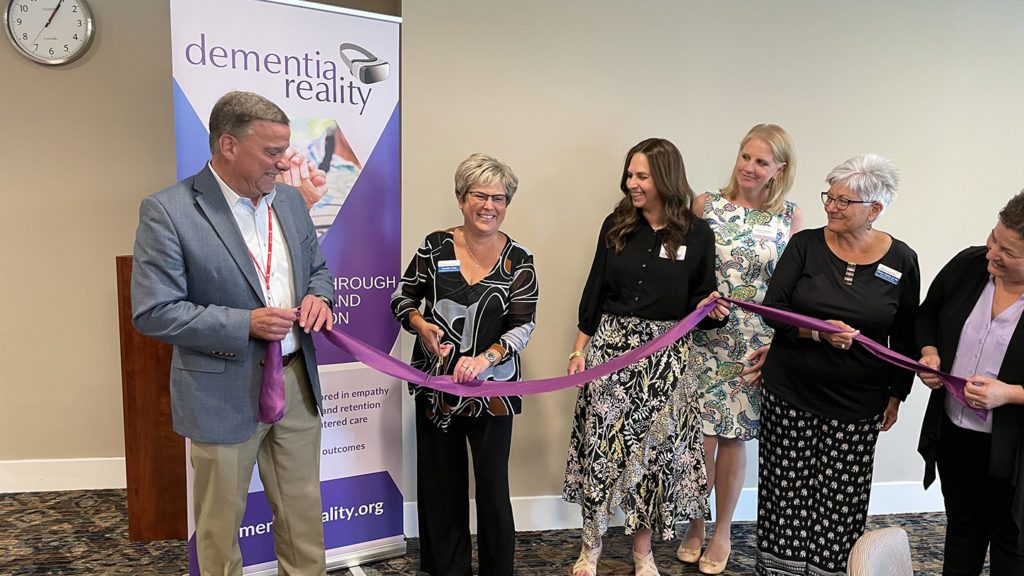
Care for people living with Alzheimer’s disease and other dementias is getting a boost from training and education programs designed to highlight the individuals and not the disease.
Montessori principles
Larksfield Place, a Wichita, KS, not-for-profit life plan community, is the first in the state to offer the Montessori program in its memory care setting.
The Montessori Inspired Lifestyle program, created by the Center for Applied Research in Dementia in Solon, OH, is designed to enable residents to focus on their individual strengths and engage in meaningful activities. Residents are supported through specially designed environments and social activities and individualized care.
To be designated a Bronze level credentialed community by the center, Larksfield Place demonstrated a commitment from its management and staff to provide respect, dignity and equality for its memory care residents. Staff members attended a two-day training, passed an online quiz, created an action plan and implemented elements of the Montessori method.
Virtual reality
In Chicago, senior living and care provider CJE SeniorLife and consultants Elderwerks Educational Services have joined forces to launch a six-hour virtual reality technology caregiver training program, Dementia Reality, meant to address the feelings of a caregiver and the experience of a person living with dementia. The goal is to build empathy and trust.
“A person may already deal with the loss of sight, hearing or mobility,” CJE SeniorLife Director of Engagement and Innovative Programming Cathy Samatas said. “The Dementia Reality training program is vividly characterized when the element of dementia is added. Being delivered via virtual reality is so powerful.”
Dementia educator and care consultant Jeannine Forrest, Ph.D., RN, said that Dementia Reality is unique in allowing the learner to experience empathic and non-empathic responses to caregiving situations.
“You feel like you are in the room,” Forrest said. “It will be exciting to see how this visual learning will lead to more skilled and compassionate care over time.”
CJE and Elderwerks invited long-term care providers and caregiver instructors to experience the training firsthand at Tamarisk NorthShore, an independent living community in Deerfield, IL. They are looking to train 150 to 200 caregivers by the end of the year during the pilot of the educational program.
The creators said they hope to validate that virtual reality training leaves employees more satisfied and confident in their jobs and residents happier and more engaged. They also hope to prove that it results in fewer resident injuries and hospitalizations, a reduced reliance on off-label psychotropic drugs, and cost savings for providers and states.
Simulation training
Meanwhile, the LCS Foundation has announced a $10,000 donation to support and expand programming at the Dementia Simulation House project at the University of Northern Iowa.
The project, a collaboration of the UNI gerontology program and the Northeast Iowa Area Agency on Aging, offers participants a sensory experience to enable them to better understand the challenges of living with dementia. The LCS Foundation donation will be used to add cameras for training and coaching.
“The majority of people living with dementia still live in their homes, so this simulation house provides a realistic setting for individuals and caregivers to experience and understand how they can help someone living with dementia,” UNI Profession Elaine Eshbaugh said. “Our goal is to help people with dementia thrive within our community, so having the ability to look back and observe the simulation experience will help us to improve our services with participants and provide important coaching for our students and volunteers.”
More than 375 participants have participated in the Dementia Simulation House experience since it opened in February.
LCS Executive Vice President / Chief Human Resources Officer Monica Friedman said that the LCS Foundation is committed to supporting programs such as the UNI Dementia Simulation House, which “develop and provide hands-on experience for students pursuing senior living careers.”
Educational gift
Also in the Midwest, the University of Southern Indiana Foundation has received a $1 million leadership gift from the Sol and Arlene Bronstein Foundation to expand programs of excellence in dementia care and advance care-planning education. The funds will be used to establish an endowment and provide immediate funding for five initiatives:
- Evidence-based training and certifications for dementia care and advance care-planning education for USI students and faculty, regional healthcare professionals and community members.
- Artificial intelligence and / or smart home technology to support people living with dementia.
- An annual faculty research and / or innovation award to support excellence in dementia care and / or advance care-planning.
- A new Bronstein Affiliate Visiting Faculty position at USI to focus on dementia and / or advance care-planning.
- Speakers at the Mid-America Institute on Aging and Wellness annual conference.
“The Bronstein funding allows USI’s Center for Healthy Aging and Wellness to expand programs of excellence in dementia care and advance care planning education through initiatives engaging USI students, USI faculty, regional healthcare professionals and community members,” Director of the Bronstein Center for Healthy Aging and Wellness Katie Ehlman, Ph.D., said.




